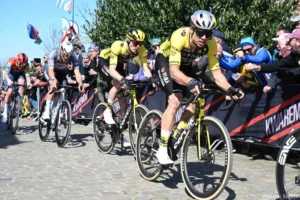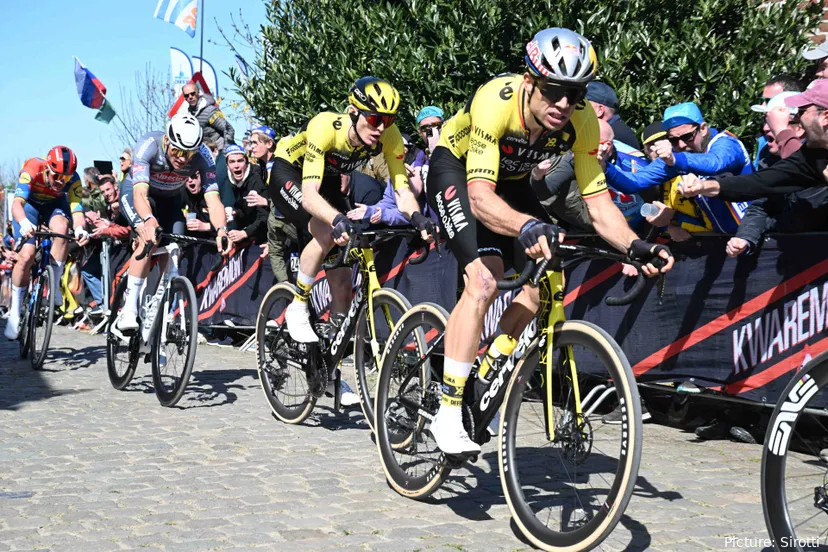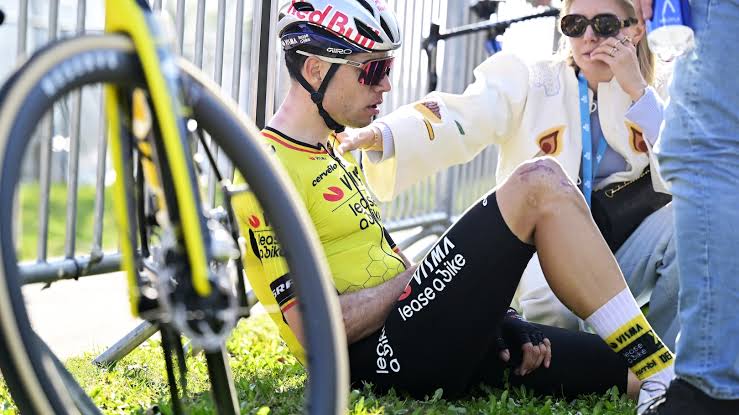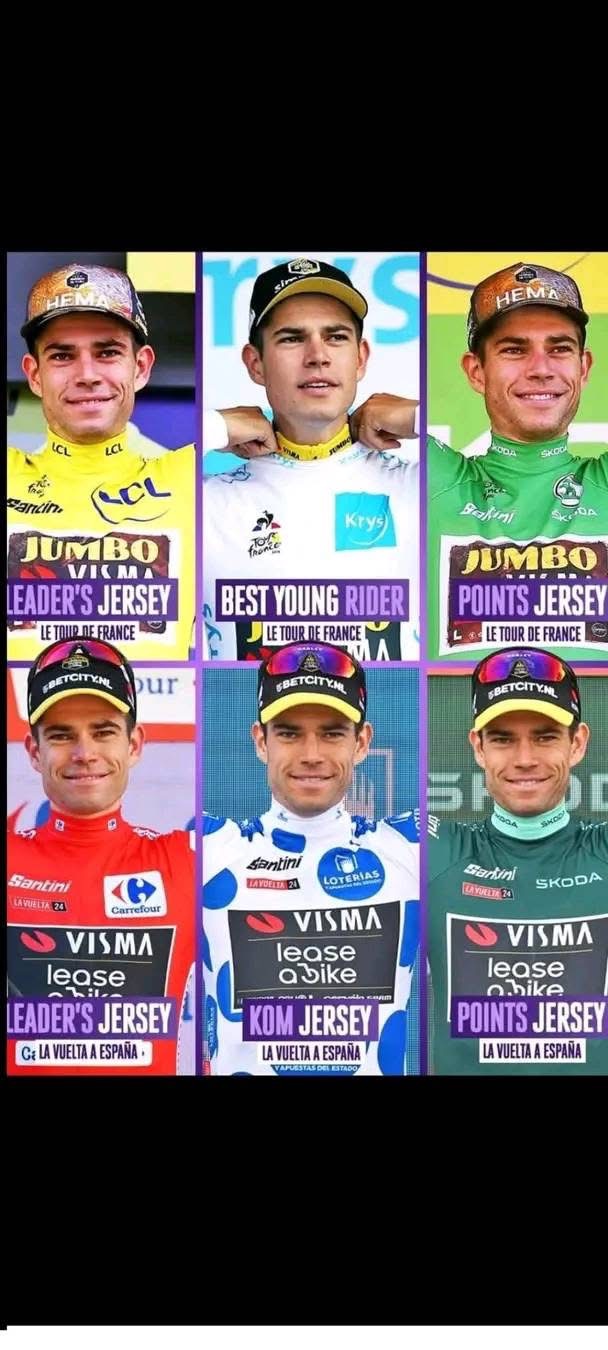**We See Cycling as a Team Sport and We Try to Beat Pogacar** — Visma’s Ambitious Mission at the Tour de France
The Tour de France, the pinnacle of professional cycling, is a relentless arena where individual brilliance and team strategy intertwine in a complex dance of endurance, tactics, and resilience. In 2023, Team Visma | Lease a Bike entered this grand spectacle with a singular mission: to challenge and, if possible, beat the reigning Tour champion, Tadej Pogacar. Their mantra? “We see cycling as a team sport and we try to beat Pogacar,” a statement that underscores their collective approach to one of the most competitive races in the world.

The Vision: A United Front Against the Slovenian Maestro
At the heart of Visma’s strategy is a cohesive, well-rounded squad capable of tackling all terrains and scenarios that the Tour de France can throw at them. The team’s leadership, spearheaded by Jonas Vingegaard—who claimed the yellow jersey in 2022—embodies the ambition to defend their title and challenge Pogacar’s dominance. But winning the Tour is never the effort of a single rider; it demands a symphony of talent, planning, and execution.
Team Visma’s philosophy is rooted in the idea that no rider is just a support act; each athlete has a pivotal role that complements the others. This collective mindset is especially evident in their roster, which is stacked with versatile, high-caliber riders who can perform across various terrains—from grueling mountain climbs to fast flat stages.
The Backbone: A Stellar Lineup
**Jonas Vingegaard**: The reigning Tour champion and team leader, Vingegaard’s ascent to the top has been nothing short of remarkable. His consistency, climbing prowess, and tactical intelligence make him the cornerstone of Visma’s ambitions.
**Matteo Jorgenson**: The American prodigy, who recently won Paris-Nice and finished sixth at the Criterium du Dauphiné, exemplifies the team’s depth. Jorgenson’s versatility—being a brilliant climber and a competent all-rounder—makes him a potential threat in the general classification (GC). While he’s primarily working for Vingegaard, the team’s management is keen on keeping his options open. As Mathieu Heijboer, head of performance, articulates, “He won’t be the first to work for Jonas. We want to keep him in GC. He’s very dangerous there.”
**Edoardo Affini and Victor Campenaerts**: These riders form the backbone for flat and transitional stages. Affini’s sprinting and lead-out skills, combined with Campenaerts’s time-trialing expertise, give the team a flexible toolkit to control stages and set the pace.
**Wout van Aert**: The Belgian powerhouse is arguably one of the most versatile riders in the peloton. With the ability to excel in sprints, crosswinds, and mountain descents, Van Aert’s role varies from support to a potential stage winner in his own right. His tactical flexibility was on display throughout the race, where he could shift seamlessly between roles depending on the stage profile.
**Tiesj Benoot**: Known for his strength in the hills and mountains, Benoot is a critical asset for the team’s mountain support and for launching attacks in the high-altitude stages.
The Strategy: Collective Power Over Individual Glory
The team’s approach emphasizes that victory is a collective effort. Every rider has an explicit role, whether it’s setting the pace, shielding the team leader from wind, or launching attacks at strategic moments. This philosophy is rooted in the belief that while Pogacar might be an individual phenomenon, his rivals can neutralize or surpass him through coordinated teamwork.
The team’s tactics revolve around patience, strategic positioning, and exploiting Pogacar’s vulnerabilities. For example, in mountain stages, Vingegaard and Jorgenson work in tandem to control the pace, sap Pogacar’s energy, and set up opportunities for a decisive attack. On flat stages, Van Aert’s all-around capabilities come into play, whether it’s controlling the peloton with a strong lead-out or contesting sprints.
The Challenges: Facing Pogacar and the Mountain of Expectations
Pogacar’s dominance in recent Tours has set a high bar, and beating him requires more than just one good day; it demands sustained effort over three weeks. His aggressive racing style, combined with his exceptional climbing, makes him a formidable opponent. The challenge for Visma is to maintain their resilience, adapt to unpredictable race dynamics, and leverage their diverse roster effectively.
The team recognizes that Pogacar is not invincible. His recent performances have shown cracks—moments of vulnerability that Vingegaard’s team aims to exploit. The key is meticulous planning, precise execution, and the collective strength of their roster.
The Significance of Versatility and Depth
One of the defining features of Team Visma is the depth of their squad. Unlike teams relying heavily on a single leader, Visma’s roster allows for multiple tactical options. Jorgenson’s GC ambitions, Van Aert’s sprinting and support potential, Benoot’s climbing strength, and Affini and Campenaerts’s stage control abilities create a layered, adaptive strategy.
This versatility is crucial in a race like the Tour de France, where conditions can change rapidly, and unpredictable events—crashes, mechanicals, or attacks—can alter the race’s course. The team’s depth ensures they can respond flexibly and maintain a competitive edge throughout the three-week battle.
The Psychological Edge: Unity and Determination
Beyond tactics and physical conditioning, the team’s cohesion and collective mindset serve as a psychological advantage. Their shared belief in the importance of teamwork, combined with unwavering determination to challenge Pogacar, fuels their focus. This mental resilience is vital when facing the grueling demands of the Tour and the relentless pressure of racing against a rider of Pogacar’s caliber.
The Road Ahead: A Historic Battle
As the Tour progressed, the narrative was set for a historic showdown. Vingegaard’s defense of his title, supported by an elite squad, against Pogacar’s relentless pursuit of victory—each rider embodying the team’s philosophy of collective effort—captured the imagination of cycling fans worldwide.
Every stage became a chess match, with strategies unfolding on steep mountain passes, flat plains, and technical descents. The team’s ability to adapt, support their leader, and seize opportunities was critical in shaping the race’s outcome.
A Testament to Team Spirit and Ambition
Team Visma’s approach at the Tour de France exemplifies the essence of cycling as a team sport. Their commitment to collective effort, strategic versatility, and relentless pursuit of victory reflects a deep understanding that in this sport, no single rider can win alone. Their ambition to beat Pogacar is not just about individual rivalry but about demonstrating that unity and teamwork can conquer even the most formidable opponents.
As the race unfolded, their story became a testament to the power of collaboration, resilience, and strategic ingenuity—reminding the world that in cycling, as in life, success is often a team effort driven by shared dreams and unwavering determination.



